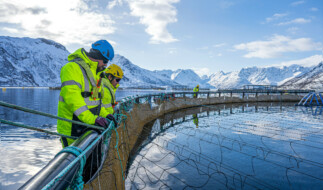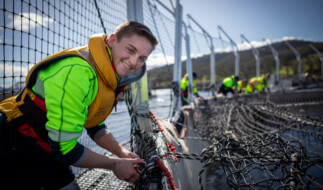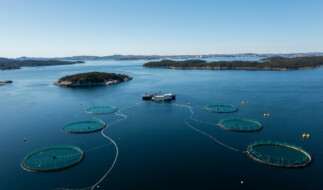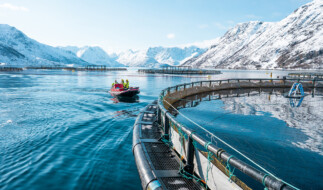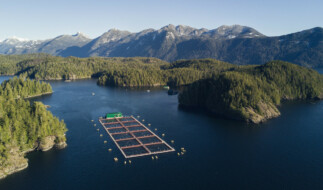Marine feed ingredients must come from sustainable sources. Ensuring responsible sourcing of marine feed ingredients supports healthy ecosystems, as well as nutritious diets for fish and people around the world who depend upon these resources.
Marine ingredients in feed
One key component to salmon feed is marine ingredients (such as krill) included as part of their specialized diets, which comes in the form of the fish oil and fish meal. These resources are naturally rich in the omega 3s salmon need to thrive, and that humans enjoy as part of a healthy diet.
Unfortunately, the percentage of wild stocks sustainability fished decreased to 64% in 2020. This not only causes negative impacts on our ecosystems but also reduces food production and results in negative social and economic consequences.
Which is why as salmon farmers we are committed to ensuring that any marine ingredients we use in our feed are from sustainable sources, and that over time we reduce our use of these resources through innovation and replace them with by-products and omega-3 rich alternatives to maintain proper nutrient levels.
Approaches to sustainable sourcing
- Ensuring all marine ingredients from forage fisheries are certified according to third party certification schemes such as MSC or Marin Trust.
- Maintaining our position that no marine ingredients come from illegal, unreported or unregulated fisheries.
- Working towards complying with the latest ASC Feed Standard for fish meal and fish oil amounts in feed.
- Utilizing more by-products to increase circularity from other sectors to turn waste into resource.
- Ensuring all krill are harvested responsibly to preserve stocks, under strict supervision in line with regulated catch limits set by the Commission for the Conservation of Antarctic Marine Living Resources. Any instance of bycatch is unacceptable and should result in immediate changes to processes and best practices by certification bodies to prevent another incident and to ensure responsible practices are not compromised.
- Supporting the creation of marine protected areas, including no-fishing areas in the Antarctic.
- Continuing to evaluate alternative ingredients to replicate the nutritional benefits krill provide, such as algae.
- Evaluating ESG risks in our supply chain using our ESG Feed Risk Assessment Tool developed in partnership with WWF.
Alternative sources of omega-3 fatty acids
Long-chain polyunsaturated omega-3 fatty acids in feed are essential nutrients for normal development and health in salmon and for the product quality of salmon. Omega-3 fatty acids, usually obtained from fish oil in salmon feed, can also be found in algae or non-marine sources such as from crops like canola. There is a great deal of innovation happening around the world to see if we can turn such alternatives into commercially viable options, which would allow us to maintain the high levels of omega-3 fatty acids in our feed, while reducing the use of marine ingredients.
In 2015, GSI and its associated feed companies launched a global tender to help identify viable sources of omega-3 fatty acids. The tender was highly successful in highlighting the growing industry need for novel resources and prompted a significant increase in the variety and number of options available to the industry. The industry feed companies are now working with multiple providers to start the incorporation of these resources into industry feeds.
Some examples include:
Progress
While progress is happening, there is still a lot to do to ensure the future sustainability of marine stocks. The combination of successful policies and management systems alongside innovation from the feed industry will help ensure marine resources can both be utilized for animal feed to support optimal health, as well as ensure they continue to contribute to biodiverse ecosystems and food security around the world.
